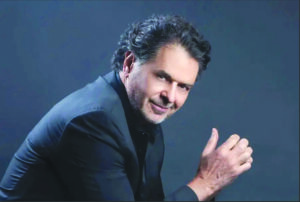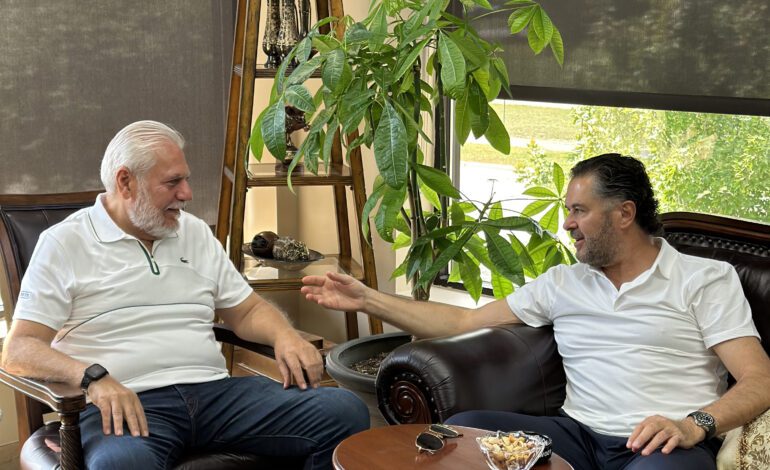DEARBORN – As part of his entertainment tour in the United States, the Lebanese superstar Ragheb Alama had a magnificent performance last Saturday, described by attendants as “a night of a lifetime” at the Motor City Casino in downtown Detroit. Alama’s performance restored the strong relationship between The Arab American community and Arab melodies, which was a strong indication of immigrants’ adherence to their original cultures and homelands.
The sold out Detroit concert came after a similar one performed by the superstar in Washington, D.C. as he continues his tour in four more states, including Miami, Florida; Houston, Texas; Los Angeles, California and New York City, where the tour will conclude on the evening of September 16.
Alama’s tour in the United States is organized by the Mega Event Production company, which is owned and operated by Tareq Jarour and his wife, Ranya.
Alama’s sold out Detroit concert came after a similar one performed by the superstar in Washington, D.C. as he continues his tour in four more states, including Miami, Florida; Houston, Texas; Los Angeles, California and New York City, where the tour will conclude on the evening of Sept. 16
As in Washington, D.C. and Detroit the rest of the tour is expected to attract a large audience of fans of the Lebanese star, who entered the entertainment industry almost four decades ago and still going strong.
On the sidelines of his Detroit concert, The Arab American News conducted an interview with the singer of the famous song “You Taught Me how to Love the World.” The discussion centered around his impressions of the Arab communities in the United States, especially in Michigan, and around the development and the changes in Arab music arts, in addition to the deterioration of the living conditions in Lebanon.
Alama said he performed an exceptional party in Detroit, organized by the sub-contractor Samer Zahr, owner of the company Luxury Live Entertainment. He expressed his appreciation to the Arab American community in Michigan and its impressive social, political and economic achievements “that raise heads.”
“The party was so wonderful and solemn that I was forced to cheat on the time allotted to me as I continued singing for about 30 additional minutes, because I did not want to interrupt the happiness and joy of the crowd that has filled the hall,” Alama said.
He indicated that he has a “special relationship” with the Arab American public that continues to enjoy listening to the Arab music as it evolves. He expressed his appreciation for the passion of the community here for the Arabic music and melodies despite the speed and complexities of American life. He noted that this attachment is transferred from immigrants to the new generations, in a way that reflects young Arab American eagerness to love their motherland and strengthen their connection to its ancient culture.
Alama rejected the notation that the Arab art and music are deteriorating and becoming insignificant, stressing that singing and music are subject to natural development like everything else in this life.

Alama expressed his pride and admiration for the achievements of the Arab American community in the Detroit area and the progress and prosperity they have achieved in the political, social and financial fields.
“Artistic taste is affected by technological development,” he said. “In the beginning it was the cassette tape, then CDs, then came smartphones and social media; and it is natural that people change their habits and their character and what they like and dislike over time.”
Alama emphasized his keenness to keep pace with technical and artistic developments so as not to find himself outside the evolving entertainment arena.
His latest work is the song “Yalla”, which he released a week ago on his channel via YouTube. it is a rhythmic dance song that is perfect for parties and festivals.
He expressed his pride and admiration for the achievements of the Arab American community in the Detroit area and the progress and prosperity they have achieved in the political, social and financial fields.
“My happiness cannot be described with the successes of Arab Americans here, their connection to their roots, their identity and the progress they have achieved in procuring prominent positions in the public and private sectors, whether at the level of the city of Dearborn, Wayne County or the entire state of Michigan,” Alama said.
He pointed out the advantages of the Lebanese ingenuity that enables them to succeed in all parts of the world and in all the fields.
“The Lebanese are cultured, educated, creative, talented and ambitious, and they can assert themselves wherever they go and do.”
Alama praised the achievements of Arab Americans across the country, pointing to the special nature which characterizes the Arab community in the Dearborn area. He also expressed his hope that the successes of the Lebanese here can help in uplifting the suffering of their brethren in the motherland and saving them from the accumulated economic deterioration and the political corruption that play an major role in the migration of Lebanese youth from their beautiful country.
I am not a political activist and I do not like to talk about politics. I am a human being, a father and I want safety and dignity for my children, my family, my fans and all people… and I do not want anyone to live under the mercy of corrupt politicians.– Superstar Ragheb Alama
He insisted that he is not politically motivated in light of his critical comments on the course of the developing Lebanese political and economic crisis, stressing that his involvement in the public debate stems primarily from a humanitarian position and being a Lebanese citizen and a father who has been affected by the turmoil.
“I am not a political activist and I do not like to talk about politics,” he said. “I am a human being, a father and I want safety and dignity for my children, my family, my fans and all people… and I do not want anyone to live under the mercy of corrupt politicians.”
He stressed that he is against sectarianism that “destroyed my country, displaced my children and destroyed the future of all Lebanese.” He also categorically denied rumors about his relations with some Lebanese politicians.
“I have no friends of the Lebanese leaders at the present time,” he said. “When Lebanon was prosperous I had some friends, but now I do not enter their homes, nor do I let them enter mine.”
Alama rejected the idea that the Lebanese people are responsible for the deterioration of the political and economic conditions in their country because they continue electing the same political leaders, placing full responsibility on the class of the political elite that works with all its might to keep the Lebanese people dependent on narrow interests and favoritism, confirming the falsity of the rumors that it is trying to place responsibility for the complete collapse in Lebanon on citizens who re-elect the same political leaders.
“No one re-elects these politicians, and the elections that keep them in decision-making positions are fraudulent and false and doesn’t reflect the opinion of the silent majority,” he said.
He explained that there are no accurate statistics showing the size of the political parties in Lebanon.
“The silent people are the majority, but we do not hear their voices because they don’t have outside political support.”
Alama pointed out that the future will ultimately be in the interest of the Lebanese people, as current politicians no longer have anything to offer their constituents after they stole the money of depositors in Lebanese banks and most of Lebanon’s resources, expressing his sorrow at the situation in his beloved country.
“The Lebanese people are great and very creative people, but they are plagued by a corrupt political class, unlike some other Arab countries, for example The United Arab Emirates, which ‘transformed from a desert into a paradise,'” he said. “Thanks to its leaders and rulers who were educated on morals, generosity and extending a helping hand to all citizens of their country.”
– The interview was conducted by Osama Siblani and transcribed by Tariq Adam







Leave a Reply